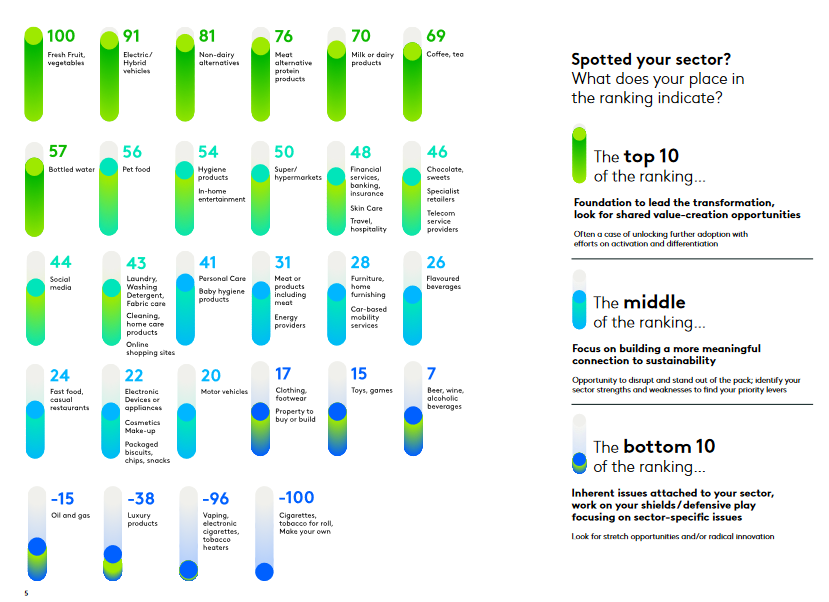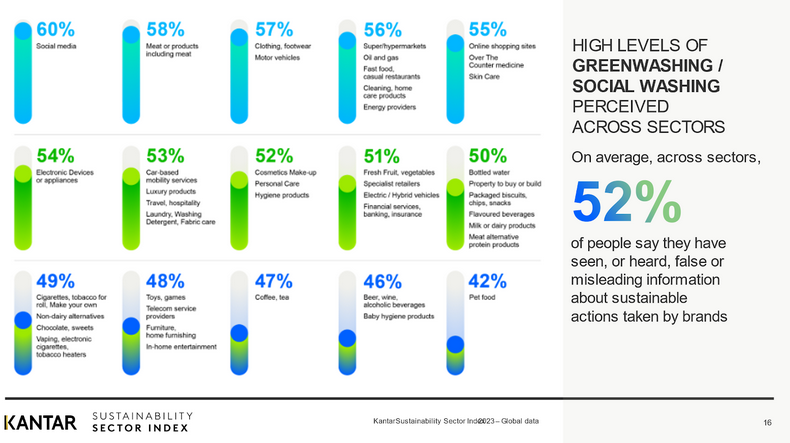88% of companies have a dedicated climate change page on their website, yet 52% of consumers have reported coming across greenwashing in brands’ sustainability claims.
According to Kantar’s annual Sustainability Sector Index (SSI), which outlines how consumers respond to brands’ sustainability efforts, people’s priorities have quickly shifted from a feeling society needs to change, to a focus on how companies are making impactful actions.
The fieldwork for the study was completed in July, the hottest month on record. At the time, the UN secretary general, António Guterres, said global warming has ended and ‘the era of global boiling has arrived.’
With environmental issues defining the daily life of one in three people globally, the report found that currently, many brands are not relevant to their consumers’ environmental and social concerns.
Corporations are trying — is it enough?
‘The climate is changing, and consumers have noticed,’ Pierre Gomy, Kantar’s Head of Sustainability, Central & Southern Europe, told MediaCat Magazine.
The Sustainability 100, a recent Investis Digital (IDX) study, evaluated hundreds of global corporate websites against 50 different sustainability-focused criteria.
It found that 82% of companies had a dedicated ESG strategy page on the website, 56% included tangible targets, and 67% detailed their ESG ratings.
Alternatively, the SSI mapped respondents concerns against the UN’s 17 Sustainable Development Goals (SDGs) and found 70% worrying about ‘climate action’, 64% about ‘responsible consumption and production’, and 58% about ‘good health.’
Despite companies’ best efforts to communicate their sustainability commitments, brands face a crisis of perceived greenwashing and socialwashing across all sectors.
‘We know that companies and brands are doing a lot, but they are not perceived as authentic, sincere, or transparent,’ Gomy says. ‘Even if you are not sure, at least communicate where you are, what you do, what you intend to do, but never hide something.’
Company claims v consumer concerns
Using its Connect.IQ benchmarking tool, The Sustainability 100 ranked the companies based on the transparency, leadership, and connectivity that they demonstrate with their digital content.
The research found that pharmaceutical company Bayer was the top brand for sustainability communications, scoring 85%.
Oil and gas company Shell came in second with 82%.
Contrastingly, Kantar named the gas and oil sector as the fourth lowest industry for perceived climate action, with a ranking of -15 out of 100, suggesting inherent issues are attached to the sector.

In September 2023, Havas Media was appointed media agency for Shell after WPP held the account, worth an estimated USD $22 million, since 2005. The appointment caused backlash across the ad industry and prompted activist group Extinction Rebellion to stage a ‘die-in’ at Havas’ London office in October.
Extinction Rebellion spokesperson Katie Burrell said, ‘Shell spends more on advertising than on renewable energy like wind and solar. But now Havas will help them produce communications and media campaigns to convince the world that they are part of the solution to the climate emergency, not one of the main causes.’
Following the criticism of Shell’s media business review, activist group Clean Creatives, along with 26 B-Corp-certified agencies, submitted an official complaint to B Lab last week, calling for the organisation to update its certification eligibility rules to disqualify ad and PR agencies that serve fossil fuel clients.
Taking a stance on greenwashing
Regulatory bodies have sought to take a stronger stance on greenwashing in recent years, with The Advertising Standards Authority (ASA) taking a stricter approach to the issue in 2021.
Recently, the ASA claimed a Repsol ad, which ran on the Financial Times website in July, was misleading because it omitted significant information about the overall environmental impact of Repsol’s business activities.
Additionally, in 2021, the European Commission found that 42% of companies with environmental claims on their websites were exaggerated, false or deceptive.
The SSI report places the cigarette and tobacco industry at the bottom of the 28 sectors identified, with a ranking of -100. At the same time, social media was perceived as the worst sector for greenwashing, with 60%.

Value-action gap
Yet despite concerns from 84% of consumers who want to make more sustainable choices, only 27% are changing their behaviour. Gomy says there are four main reasons for this disconnect, with price being a core reason as ‘sustainable offers are generally more expensive.’
‘The second one is the labels — the lack of external labels prevents them from buying a sustainable product because they don’t really believe that what they’re buying will positively impact the environment and society.
‘The third reason is that it’s hard to find in the stores — so it’s important to be very visible. And the fourth reason is that they don’t necessarily believe that the sustainable alternative is as good as the classic one,’ he said.
In other evolving beliefs, Kantar conducted a global study with marketing and CSR directors of some of the world’s biggest companies two years ago. At the time, 29% of respondents considered their company to be doing ‘quite well’ regarding sustainability. This year, it’s only 15%.
Gomy said: ‘It doesn’t mean that companies are doing badly, but people are now more aware of what they have to do to achieve sustainable transformation.’
Featured image: mitbg000 / Pexels


























